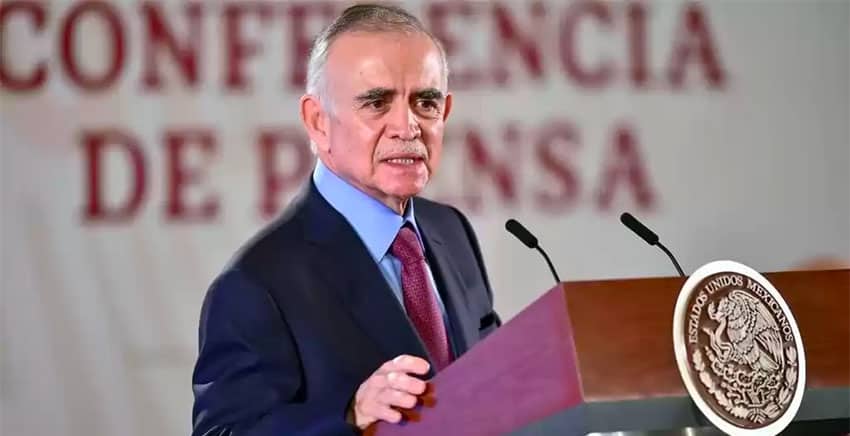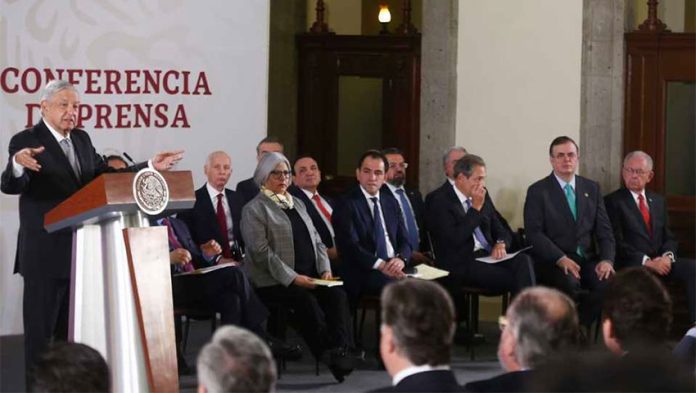The federal government and representatives of the private sector on Tuesday presented a US $42.95-billion infrastructure plan designed to give the ailing economy a “little push.”
President López Obrador told reporters at his morning press conference that almost 80% of investment in the National Infrastructure Plan (PNI) – which includes 147 projects in its first stage – will come from the private sector.
“. . . [The plan] is basically with private investment. This is important because the participation of the private sector is needed for the economic growth of the country,” he said.
“Public investment is important but it basically functions as seed capital to trigger growth with the participation of the private sector,” López Obrador added.
He thanked the business sector for its commitment to contribute to the social development of the country, asserting that it is a “clear and frank show of support” for the government and that together they will “take our beloved Mexico forward.”

The president’s chief of staff, Alfonso Romo, described the 147 initial projects as “a first chapter” of the PNI.
“It’s a living program [that will grow]. We will be reporting continually, approximately every three months . . . This project will create a lot of jobs, it will improve the country’s competitiveness,” he said.
“. . . I want to be very clear, this is a commitment, they’re projects that we’ve been reviewing . . . very closely with [government] secretaries, who are responsible for the tenders and transparency,” Romo said.
Energy and healthcare projects are not part of the PNI and will be presented separately, the chief of staff said.
Speaking on Monday after revised data showed that Mexico entered a technical recession in the first half of the year, Finance Secretary Arturo Herrera said the infrastructure plan will give the economy a “little push” forward.
“If we want the country to grow, we need to invest in infrastructure,” he said, acknowledging that the economy is not expanding as the government would like.
Business Coordinating Council (CCE) president Carlos Salazar explained today that the first PNI projects will build highway, telecommunications, transport, energy, tourism, water and sanitation infrastructure.
They will be split more or less evenly throughout the country: 45 will be built in central Mexico, 49 in the north and 42 in the south, Salazar said. The other 11 projects will extend across regions, he added.
About a third of the PNI investment – just over US $14.5 billion – will go to the transportation sector, including highway, rail, airport and port projects, the CCE chief said.
The other big winner is the tourism industry: about US $12.9 billion will be allocated to 15 projects, most of which will be built in 2020.
Salazar explained that US $6 billion will be invested in telecommunications and that US $2.4 billion will go to water and sanitation projects.
Salazar said that 72 projects will be built next year, 41 more will be completed between 2021 and 2022 and the remaining 34 will be finished in 2023 or 2024, the last year of the government’s six-year term.

“This [public-private] agreement implies a call to businesspeople to join with the authorities . . . The private sector is united . . . We want to demonstrate our commitment with Mexico, with you [López Obrador] and the government you represent,” he said.
Salazar also said the private sector is committed to being transparent about the projects in which it participates.
“. . . We will be constantly reporting the progress of each of these projects and we will definitely ask for the help of [government] secretaries in order to overcome any obstacle,” he said.
For his part, Mexican Banking Association president Luis Niño said that banks have set aside the peso equivalent of US $40.9 billion for infrastructure project investment and therefore PNI funding is guaranteed.
Mexican Business Council President Antonio Del Valle Perochena said the first stage of the PNI should serve as a base for more projects and greater investment.
Mexico is an attractive country in which to invest, he asserted, a claim supported by data that shows that foreign direct investment increased 7.8% in the first nine months of 2019 compared to the same period last year.
Among a who’s who of business leaders who are backing the National Infrastructure Plan is Mexico’s richest man, Carlos Slim, who last week asserted that the country needs a boost in infrastructure spending to trigger economic growth.
Source: El Economista (sp), Milenio (sp), El Financiero (sp)
